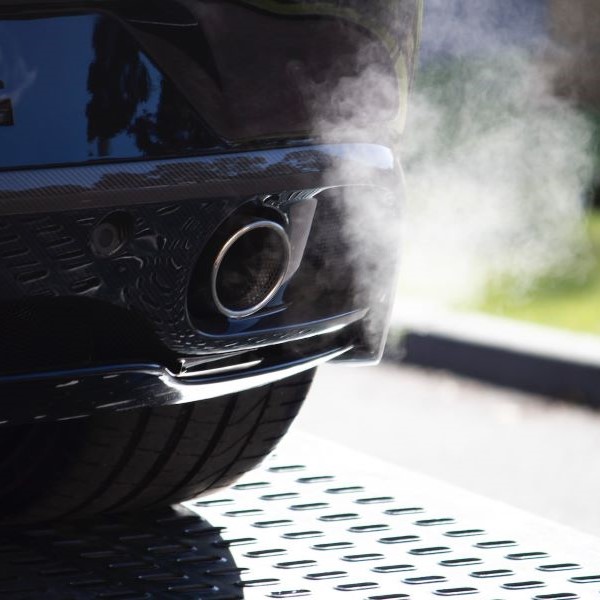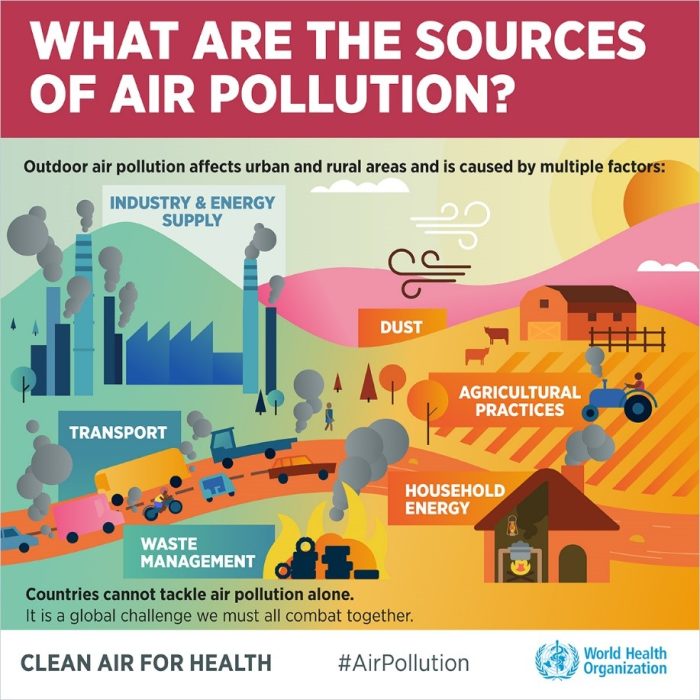
The Air We Breathe is Killing Us…



Air pollution is caused by gases and particles emitted by a variety of human activities and natural sources. Air pollution comes from many sources, including cookstoves, vehicles, power plants, and wildfires. It can cause heart disease, stroke, lung cancer, and respiratory diseases. It also harms our natural environment, decreasing oxygen supply in our oceans, making it harder for plants to grow and contributing to the climate crisis.
“
Globally, air pollution causes approximately 6.7 million premature deaths annually.
Transport, households, industry, agriculture and waste are five sectors that constitute the main sources of human driven air pollution. Good policies and practices can significantly reduce emissions from each sector such as reducing your individual waste, switching to a plant rich diet, planting more trees, using public transport and electric vehicles, installing air quality monitors to track and reduce air pollutants.
Although air pollution can be harmful to everyone, some people are more affected because they live in highly polluted areas and are therefore exposed to much higher air pollution levels. Major cities such as Manchester, London, Glasgow, Edinburgh, and Birmingham experience significantly greater pollution levels, particularly nitrogen dioxide due to high pollution levels within the transportation sector.
Air pollution will remain a huge problem across the UK in the near to medium term, but it can be solved. A number of environmental groups have already taken the UK Government to court on numerous occasions and have won, over the government’s failure to protect the UK public from toxic air pollution.
Science has never been clearer on the harms caused by air pollution, even at low concentrations, meanwhile our government is proposing a future where we could have little protection from dirty air.
It is a matter of great concern that instead of putting forward plans to address this ongoing public health crisis, UK ministers are presenting Bills in Parliament which could potentially remove all existing legal protections within our Statute Book.

“I believe every property in our major cities (to begin with…) should require a form of air pollution assessment, in addition to the current Energy Performance Certificate (EPC) in order to assess the levels of air pollution in the selected property area, with a scale of air pollution hazard similar to EPC ratings bands.” – Alan MacLeod, CEO & Founder, Pure energy (REGen) Limited.
“
According to the World Health Organisation, 99% of people breathe unsafe air.
For example, any subject property will be Air Pollution rated on a scale from A to G, with A being excellent (ultra-low pollution levels) and G being a significant health risk (abnormally high pollution levels). People will then be fully informed of the environmental profile of each individual property, combining both internal and external environmental effects for the space they inhabit.
The health of our communities is clearly suffering due to currently lax pollution legislation, but people will always make better decisions when they are more accurately informed, and therefore can make better health choices based on the enhanced data available. Perhaps then we can begin to live in an environmentally benign and healthier community.
Ultra-Low Emission Zones (ULEZ) in major city centres will support the better environment agenda, however according to a recent Report from Transport for London (TfL), last year’s expansion of London’s Ultra Low Emission Zone (ULEZ) has failed to dramatically reduce the level of emissions from vehicles across the capital.

Understanding more about the air pollution in your area can help you make more informed decisions on how to reduce your pollution exposure. The “Clean Air Hub” has collected some of the best UK information together in one place.
A wider monitoring network is also available in London, so if you live or work in London, click on the link for more specific information, Clean Air Hub.
We can all do our part to reduce air pollution. Check out UNEP’s Practical Guide on #BeatAirPollution and see how you can make a difference.
To reduce air pollution, make underused assets work for you, we can help you understand the most suitable renewable energy solutions and electric vehicle charging options for your business or home. Contact us on +44 (0) 1382 657457, or email [email protected].
Feature photo by Matt Boitor on Unsplash
Services (UK/International)